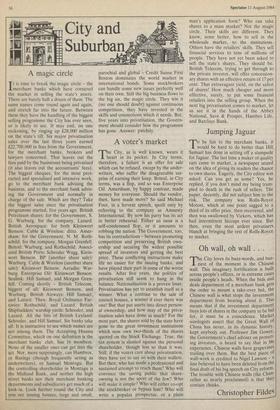City and
A magic circle
-Ft is time to break the magic circle — the 'merchant banks which have cornered the market in selling the state's assets. There are barely half a dozen of them. The same names come round again and again, and stretch far into the future. Between them they have the handling of the biggest selling programme the City has ever seen, or is likely to see. It may end, on one reckoning, by ringing up £28,000 million on the state's till. Six major privatisation sales over the last three years earned £22,700,000 in fees from the Government, for the merchant banks, brokers and lawyers concerned. That leaves out the fees paid by the businesses being privatised (it also leaves out the accountants' fees). The biggest cheques, for the most prot- racted and specialised and intensive work, go to the merchant bank advising the business, and to the merchant bank advis- ing the Government and normally in charge of the sale. Which are they? Take the biggest sales since the privatisation programme started, five years ago. British Petroleum shares: for the Government, S. G. Warburg, for the company, Lazard. British Aerospace: for both Kleinwort Benson. Cable & Wireless: ditto. Amer- sham: for the Government, N. M. Roth- schild, for the company, Morgan Grenfell. Britoil: Warburg, and Rothschild. Associ- ated British Ports: Schroder Wagg, Klein- wort Benson. BP (another share sale): Warburg. Cable & Wireless (another share sale): Kleinwort Benson. Aeradio: War- burg. Enterprise Oil: Kleinwort Benson. Sealink: Hill Samuel, and Morgan Gren- fell. Coming shortly — British Telecom, biggest of all: Kleinwort Benson, and Warburg. British Airways: Hill Samuel, and Lazard. Then, Royal Ordnance Fac- tories: Rothschild, and Lazard. British Shipbuilders' warship yards: Schroder, and Lazard. All the bits of British Leyland: Schroder, and Hill Samuel. Six banks take all. It is instructive to see which names are not among them. The Accepting Houses Committee, which on one definition is the merchant banks' club, has 16 members. None of the smaller ones can get into the act. Nor, more surprisingly, can Hambros, or Barings (though frequently acting as underwriters), or Samuel Montagu. But the controlling shareholder in Montagu is the Midland Bank, and neither the high street banks nor their merchant banking departments and subsidiaries get much of a look-in. Look further round the City and you see issuing houses, large and small, parochial and global — Credit Suisse First Boston dominates the world market in international bonds. Some stockbrokers can handle some new issues perfectly well on their own. Still the big business flows to the big six, the magic circle. They win it (no one should doubt) against continuous competition, they have invested in the skills and connections which it needs. But, five years into privatisation, the Govern- ment should consider how the programme has gone. Answer: patchily.






































 Previous page
Previous page